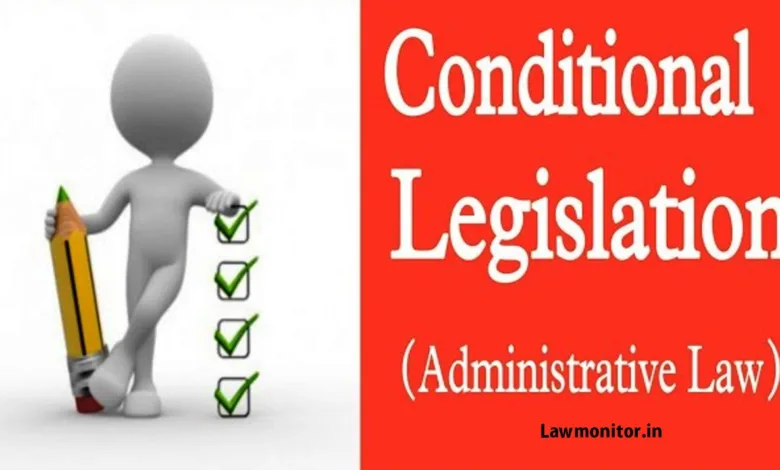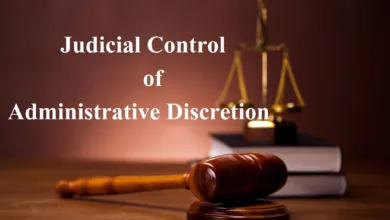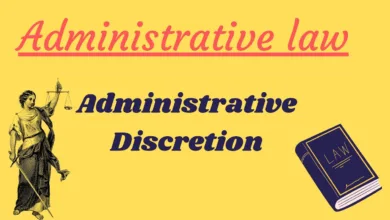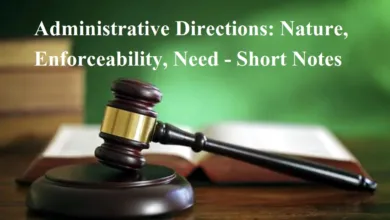Conditional Legislation in India: A Detailed Overview
Conditional Legislation in India: A Detailed Overview. It is intersection between independent and interdependent functioning of legislative and executive organs.

When the law is complete and certain conditions are laid down as to how and when the law would be applied by the delegate, it is conditional legislation
Introduction:
Conditional legislation in India represents the intersection between independent and interdependent functioning of legislative and executive organs. The delegation of legislative powers to subordinates for law implementation, with specific conditions attached, characterizes conditional legislation. It’s a vital aspect where lawmakers confer limited discretion for law execution, leading to its effective application. This concept exists within the realm of delegated legislation, showcasing its nuanced role in Indian law.
In the Venn diagram of Legislation , if delegation of power is a subset then conditional legislation is a sub-sub-set shown by “A” , “B” and “C” respectively.
A – LEGISLATION
B – DELEGATED LEGISLATION
C- CONDITIONAL LEGISLATION
Delegation of Power and Administrative Law:
It is the concept of delegation of power that has given rise to what is currently known as Administrative Law, a pivotal, uncodified legal domain in India’s governance. Its primary function involves exercising allotted powers within defined spheres. Parliament’s occasional inaccessibility for immediate decisions, especially in trivial or urgent matters, necessitates delegated legislation. This delegated authority steps in during crises, natural disasters, or situations requiring specialized expertise, aiding law implementation.
Definition of Conditional Legislation:
Conditional legislation entails a complete law with conditions stipulating when and how it should be enforced by the delegate. This form of legislation lacks law-making powers but allows the delegate to determine the law’s effective application.
| Daily current affairs Updates | Click Here |
| Law Notes Free Channel | Click Here |
As per the Supreme Court in Hamdard Dawakhana v. Union of India, stated that in conditional legislation, the delegate’s power is that of determining when a legislative declared rule of conduct shall become effective.
Instances of Conditional Legislation:
Conditional legislation manifests in various scenarios:
I. The legislature empowers the executive to expand the activity of a current law to a specific area or region.
II. To determine and decide the time of application of an Act to a given area.
III. To broaden the span of a Temporary Act, subject to maximum period fixed by the legislative assembly.
IV. To determine and decide the degree and limits within which the statute or Act should be employable and operative.
V. Lastly, to introduce a special law if the contemplated situation has arisen in the opinion of the government.
Categories of Conditional Legislation:
Conditional legislation can be classified into three categories:
- Subjective Satisfaction: Delegate’s subjective assessment to determine the correct time for the Act’s application in a given region.
- Partial Withdrawal: Deciding under what circumstances a completed Act might be partially withdrawn from operation in specific areas or cases.
- Objective Consideration: Delegate’s reliance on objective data to grant benefits or to prevent the loss of existing benefits under an Act.
Detail notes on Categories of Conditional Legislation:
1. In the first category, when the Legislature has completed the task of enacting a Statute, the entire structure of the legislation is ready but its future appropriateness to a given region is left to the subjective satisfaction of the delegate who being fulfilled and satisfied about the conditions showing the correct time for applying the provisions of the said Act to a given region exercises that power as a delegate of the parent legislative body. At the point when the Act itself is finished and is sanctioned to be consistently applied in future to each one of the individuals who are to be secured by the scope of the Act, the Legislature can be said to have completed its task. This would be an act of pure and simple conditional legislation depending upon the subjective satisfaction of the delegate as to when the said Act enacted and completed by the parent Legislature is to be made effective.
2. The second category of conditional legislations wherein the delegate has to decide whether and under what circumstances a completed Act of the parent legislation which has already come into force is to be partially withdrawn from operation in a given area or in given cases so as not to be applicable to a given class of persons who are otherwise admittedly governed by the Act. In such type of cases, the delegate has to act negatively by withdrawing the operating act, fully or partially due to any causes of action of governance.
3. The third category of cases wherein the exercise of conditional legislation would depend upon satisfaction of the delegate in objective facts placed by one class of persons seeking benefit of such an exercise with a view to deprive the rival class of persons who otherwise might have already got statutory benefits under the Act and who are likely to lose the existing benefit because of exercise of such a power by the delegate. In such type of cases the satisfaction of the delegate has necessarily to be based on objective consideration of the relevant data for and against the exercise of such power.
Landmark Cases and Legal Precedents:
- Re: Delhi Laws Act Case: The case addressed whether granting the Lt. Governor power to extend law application constituted delegation. The Privy Council upheld conditional legislation, emphasizing that the Indian legislature had exercised judgment, and the delegate’s role was to enforce it under specific conditions.
- Jatindra Nath v. Province of Bihar: The case clarified that in India, no delegated legislation exists beyond conditional legislation.
Conditional Legislation vs. Delegated Legislation:
Conditional legislation, a subset of delegated legislation, differs by not conferring law-making powers to another body. Instead, it focuses on implementing laws without actual law creation. Both involve delegates working towards better law implementation. Delegated legislation frames rules, guidelines, and notifications, while conditional legislation focuses on executing laws based on specified conditions.
In the end, whether delegated or conditional, both types function under the authority granted by central and state law-making bodies, playing crucial roles in effective governance and law execution in India.
References:
- AIR 1960 SC 554.
- Dr. N. V. Paranjape, Studies in Jurisprudence and Legal Theory, 8th Edition, Central Law Agency, Pg. 331.
- In Re the Delhi Laws Act, 1912 v. The Part C States (Laws) Act, 1951 AIR 332.
- AIR 1951 SC 347.
- IN RE DELHI LAWS ACT CASE: LANDMARK IN CONCEPT OF DELEGATED LEGISLATION IN INDIA, MANUPATRA ARTICLES. (available at http://www.manupatra.com/roundup/333/Articles/In%20re%20Delhi%20Laws%20Act%20Case.pdf )
- (1949) 2 FCR 595.




